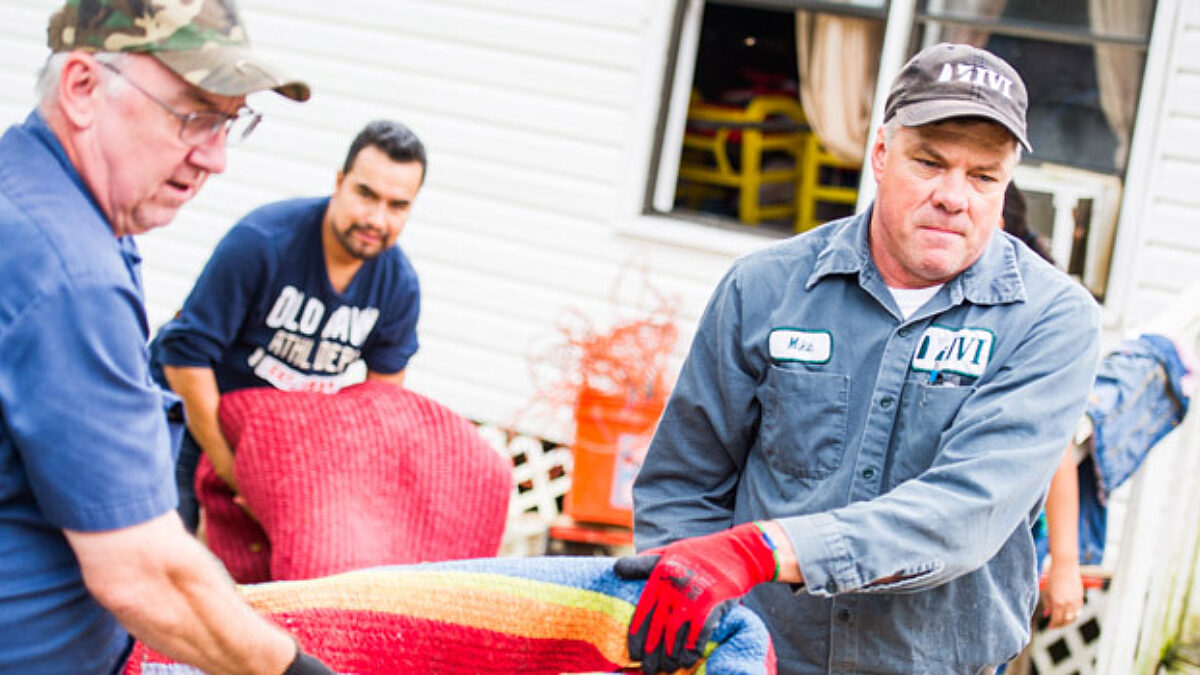
United Methodists' Spanish outreach provides help, hope after S.C. flood
Spanish hotline for flood victims is 844-344-2270
By Jessica Brodie
GREENWOOD—Rodrigo Moran will never forget the morning of the great flood.
“My boy said, ‘Look! The rio, the water overflows!’” Moran explained in halting English, holding his hand to demonstrate how a foot of water from a nearby creek swept into his family’s tiny trailer in the Wilson Creek mobile home park in Greenwood.
He looked outside and saw police, knew they had to go, but he, his wife, Maria, and their five children were terrified.
“My babies were crying, scared, hiding,” Moran said outside the home, which was still waterlogged nearly a week after the catastrophic Oct. 3 storm that dumped massive amounts of water on South Carolina, closed hundreds of bridges and roads and claimed the lives of 19 people. “We needed help.”
Moran and his family were one of the lucky ones—they got out, lives intact, and though they were living at a Red Cross shelter the day the Advocate visited, they had food, a warm place to sleep and assistance from Christian brothers and sisters who do all they can to show Christ’s love after a disaster: the South Carolina United Methodist Volunteers in Mission Early Response Team, which was onsite mucking out the water and getting the home safe for future repair.
Whether on the banks of a tiny creek in Greenwood or evacuated from downtown Columbia or Charleston, so many people across South Carolina were hurt by the storm, losing homes, cars and other valuable property, even their lives. And as the South Carolina Conference does its part to respond to needs, it’s also being sure to reach out to some of the most vulnerable people in our midst—Hispanic/Latino neighbors, many of whom only speak Spanish and do not know what help is out there, and how South Carolina United Methodists can be God’s hands and feet for them.
The Rev. Elizabeth Murray, coordinator of Hispanic/Latino Ministries for the conference, said the UMCSC has embraced five new tangible measures to help Spanish-speaking victims of the flood so they, too, know they are not alone. From a Spanish-language flood hotline to bilingual door hangers and resource fact sheets to a website and more, the conference is stepping up to bring awareness and needed information to the estimated 241,000 Hispanic/Latinos living in the state.
“This is the first time we are being intentional about reaching out to the Hispanic/Latino community post-natural disaster, and we are trying our best and being as faithful as possible to help Hispanic/Latino people who are in need to continue to build partnerships and relationships,” Murray said.
- Spanish flood hotline: This special toll-free phone number (844-344-2270) rings to a voicemail in Spanish that instructs victims of the flood to leave a detailed message with contact information about help they need. A Spanish-speaking member of the team calls them back to make contact and deliver that assistance.
- Bilingual fact sheet: This English-Spanish resource list has been distributed to clergy, who are passing it out in their areas to anyone impacted by the flood. It has basic information on how the UMC can help, from school kits and cleaning buckets to prayer and a helping hand, plus provides a website and the hotline number.
- Bilingual door hangers: Placed on front-door handles by ERT members as they canvas neighborhoods, these English-Spanish placards say, “Sorry we missed you—the UMC can help,” and explain who they can call for assistance.
- Spanish website: This website (www.umcsc.org/ayuda) is the Spanish-language version of the conference’s English flood website, with resources and information on how to get help and how to help others.
- Spanish speakers: The task force has developed a list of more than a dozen UMCSC clergy and lay Spanish speakers who can translate and help communicate needed information about the flood to Hispanic/Latino people—such as when interfacing with ERT teams and others onsite to help.
Murray said reaching out to Hispanic/Latino people is extremely important, as Scripture said when one part of the body of Christ is suffering, all suffer, and it’s incumbent upon all to cross even language divides to provide help, hope and prayer in a disaster.
“It’s a population in our community that we the UMC are less engaged with, and in times of disaster, Hispanic/Latino people might tend to shy away from help because of issues like insufficient documentation or a language barrier,” Murray said.
Conference Communications Director Matt Brodie said the five new outreach measures are a significant way the UMCSC can help.
“There’s a very large Hispanic population in South Carolina, and they are also very underserved, especially in a disaster, and if we are not very intentional about communicating and reaching out to them, they are likely to fall through the cracks and not receive any assistance,” he said. “Jesus said to love your neighbor, and by being in ministry with our Hispanic/Latino population, we are fulfilling that role.”
For Moran, standing outside his home and watching ERT members haul away flood-soaked mattresses and children’s toys, the struggle is far from over. But he said he appreciates what the UMC is providing, whether they are able to return to their home or not.
“I thank you for the help,” Moran said, his face grave and his eyes round as he surveys the damage. “You help me and my babies.”
For more on how to help the task force in its work to reach out to Hispanic/Latino brothers and sisters, now and in the future, or to add your name to the list of Spanish speakers willing to translate if needed, contact Murray at [email protected].